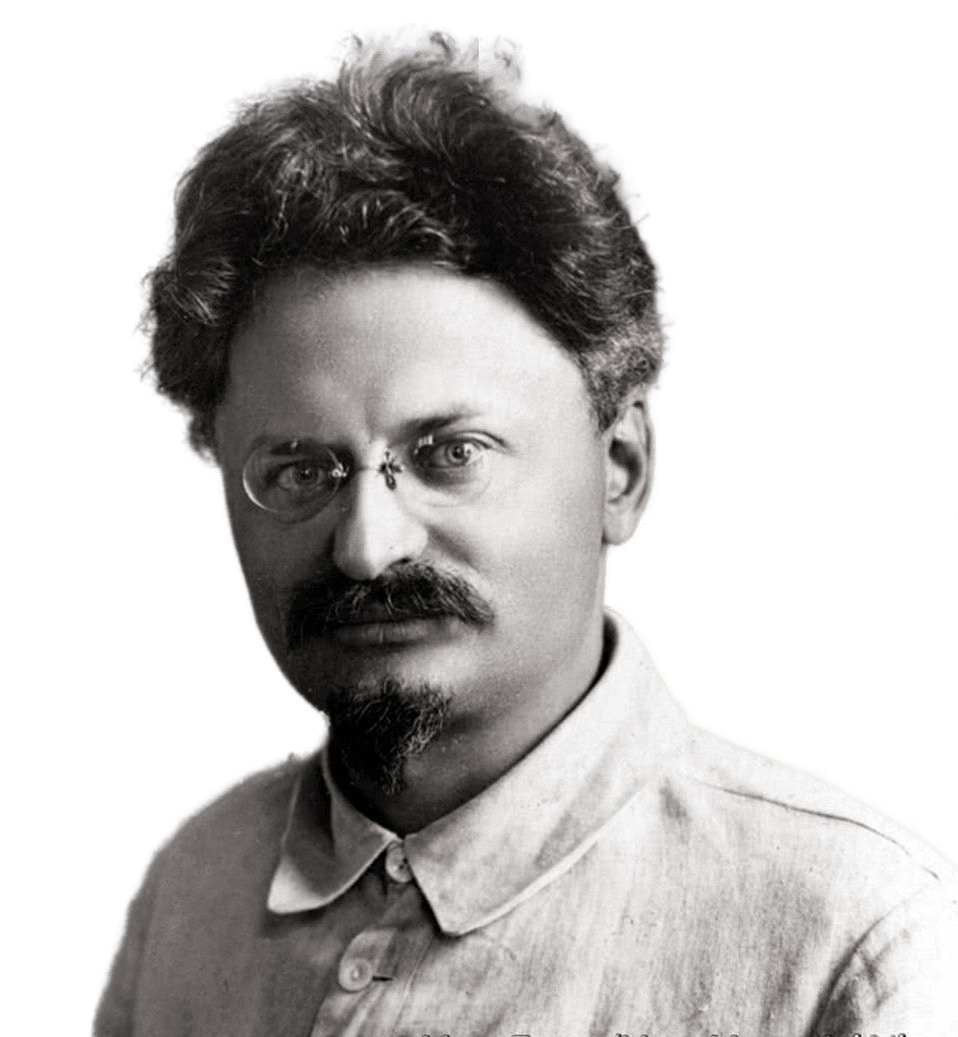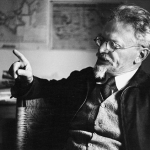
16.12.2022
Trotsky Lev Davidovich (Leib Bronstein) was born October 26, 1879 in Kherson Province in the family of a Jewish landowner. He graduated from high school and then from the Odessa College.
Attending free lectures at the university, he became close to revolutionary-minded youth, and soon led a small underground circle himself.
In 1902, Lev Davidovich flees abroad and meets Lenin in London. Through Vladimir Lenin, Trotsky becomes acquainted with Plekhanov, Zasulich and other social democrats. After participating in the 2nd Congress of the RSDLP, Trotsky joins the Mensheviks and writes a manifesto of Russian Menshevism, full of attacks on Leninist principles.
Trotsky gave the leading role in the revolution to the proletariat. He soon split with Dan and Martov, on the grounds that these social democrats believed that the liberal bourgeoisie should be the revolutionary leader.
With the beginning of the first Russian Revolution, Trotsky returns to St. Petersburg. In the autumn of 1905 he actively leads the St. Petersburg Soviet. By his own hand he draws up manifestos and resolutions. With his associate Parvus Trotsky becomes at the helm of the “Russian Gazette,” which in a very short time scales into a multi-circulation political newspaper.
The rise of the Russian Gazette was rapid, but life was short. In December 1905, the newspaper’s management was arrested, but during this short time, the young and tireless Trotsky made a name for himself as a vanguard revolutionary. Trotsky was arrested, spent a year in detention, and then exiled to Siberia. But on the way he escapes and goes to London again.
Trotsky takes a centrist position, joining neither the Mensheviks nor the Bolsheviks. After the London Congress of the RSDLP, Trotsky goes to Vienna and there joins the Social Democratic Party, takes an active part in party life, and enters the local university. Under Trotsky’s leadership, the small newspaper Pravda becomes his personal publication.
These were the years of a sharp polemic between Lenin and Trotsky. In fact, it was a struggle for leadership. Lenin gained the upper hand in this confrontation. He dragged the most active part of the party behind him. Funds for Pravda were no longer allocated and Lev Davidovich was forced to close it.
After the outbreak of World War I, Leon Trotsky moved to Paris and then to Spain. But he is arrested and exiled to America. In New York, together with Bukharin, Uritsky and Volodarsky, he works for the newspaper “New World”.
In America he is caught up in the news of the February Revolution. But this time he agrees with Lenin and calls not to support the Provisional Government, but to end the war and transfer power to the Soviets. After his return to Russia, the brightest period of his biography begins. He was resolute and courageous.
The best orator of the revolution was undoubtedly Trotsky, he was in the people’s favor and his role in the revolution was one of the main ones. Under his leadership there was an armed uprising on October 25, and then under his control Kerensky’s rebellion was defeated.
As Commissar of Foreign Affairs, Trotsky held a series of talks with the Allies, and then with the Germans to end the war. But the Germans demanded to tear away from Russia Lithuania, Poland, Kurland. Lenin preferred to agree, but Trotsky strongly objected.
But soon the German offensive intensified, the threat also approached central Russia. And eventually the treaty was signed, but on much less favorable terms for Russia. But by this time Lev Davidovich had already resigned. He was appointed Commissar for Military Affairs.
Trotsky took charge of the Soviet armed forces and began to actively form a new army practically from scratch. He personally prepared several regulations, including a decree on compulsory military training, summoned old cadre officers, and headed the Revolutionary Military Council of the Republic.
At this time the ring of fronts stretched ten thousand kilometers. Entente troops outnumbered Soviet forces many times over. Trotsky was personally present at the hottest points, moving around on his armored train.
A cavalry of three hundred men accompanied him on these trips. The Red Army men had heard about the brutality of this command and did not allow themselves to relax for a second. But fear alone could not mobilize your army against the superior forces of the enemy; what was needed here was unquestioning authority and leadership.
Trotsky issues several orders, puts the right officers in key positions, restores discipline, and does not hesitate to shoot. In a short time he stopped the retreat and even returned captured Kazan. And we must pay tribute to Trotsky, who, being a non-military man, was able to organize at the highest level the army at war.
After the war, Trotsky decides to apply the experience gained in the national economy. He transforms military units into labor units, writes regulations for the new units and applies harsh disciplinary measures. Trotsky believed that only the dictatorship of the proletariat could hold power in a peasant country.
And in the case of peasant revolts, there was always a punitive detachment. Lev Davidovich called for the abolition of the market, for the establishment of public catering at all levels, and for the cultivation of self-sacrifice for a common goal in educational institutions.
When Lenin became seriously ill, a power struggle began between Stalin and Trotsky. The head of the party apparatus, Joseph Vissarionovich, was a very serious opponent. Trotsky had the youth behind him, but Stalin had the majority.
The struggle was fierce, the opponents resorted to all kinds of measures to discredit each other. Trotsky lost. He was expelled from the Central Committee, and then was sent to Alma-Ata, and then abroad. Trotsky spent a few years in Turkey. He wrote many books and articles there. After several changes of residence, Trotsky moved to Mexico.
Lev Davidovich survived the first attempt on his life in 1940, but four months later the Spanish NKVD agent Ramon Mercader, under the guise of a like-minded man, gets close to Trotsky and at a convenient moment inflicts a fatal blow to his head with an ice pick. The next day, on August 21, 1940, Trotsky died.




